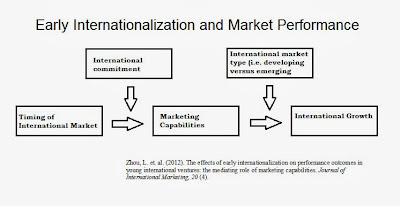From the fire
into the frying pan is one way to describe entrepreneurs that start out
engaging in international marketing. According to Zhou et. al. (2012) such entrepreneurs
often excel quickly past their competitors as the organization maintains
pliability and learning to match market needs. Despite the overall risks of
marking internationally from the beginning, organizations are more likely to
grow quickly and obtain greater cash flow.
Organizations
must learn to be competitive. Starts up businesses have a significant learning
curve at first but begins to wane over time as they gain skills. When they are
connected quickly to the international markets there is more opportunity to
find resources that requires greater learning activity. Doing so before the
small company becomes structured helps to ensure its pliability in finding new
revenue streams and maintains its entrepreneurial activities.
To be successful such firms will need to exploit
both foreign market knowledge and networks to create the right kind of
internationalization. It primarily impacts the perceptions of decision-makers
that will need to focus on finding relevant information and using connections with
larger international firms to create market opportunities. It changes the
perception from the beginning of an organizations life to a wider world.
According to learning theory, “what an organization knows at its birth will determine what it searches
for, what it experiences, and how it interprets what it encounters” (Huber,
1991, p. 91). It is an issue of perspective gaining and creating the right
vantage points to obtain information. This information can then be used to
create new ways of solving problems.
International marketing requires a wider perceptual
field. Business must ensure they understand the varying niche markets around
the globe, know which ones meet their needs, and understand how to provide
communication to customers within that market. The more they understand how to
match their marketing to the global perspective the less risk of financial
failure they face over time.
Moving beyond this report we can see that the
Internet and the interconnectivity of various groups of people affords
opportunities not seen a few decades ago. Products can be marketed, shipped and
sold around the globe with less effort than in the past. The Internet is
affording opportunities to not only get out the message about products but also
to integrate more information through search engines, services, and analysis.
Where businesses were once limited to local companies they can now explode onto
the international market.
Zhou, L. et. al. (2012). The effects
of early internationalization on performance outcomes in young international
ventures: the mediating role of marketing capabilities. Journal of International Marketing, 20 (4).
Huber, George P. (1991) Organizational Learning: The
Contributing Processes and Literatures. Organization
Science, 2 (1), 88-115.

No comments:
Post a Comment